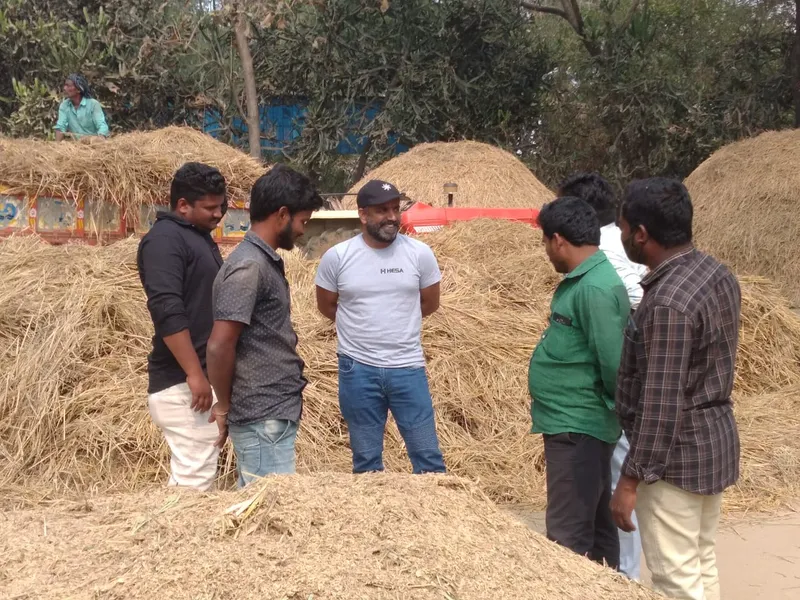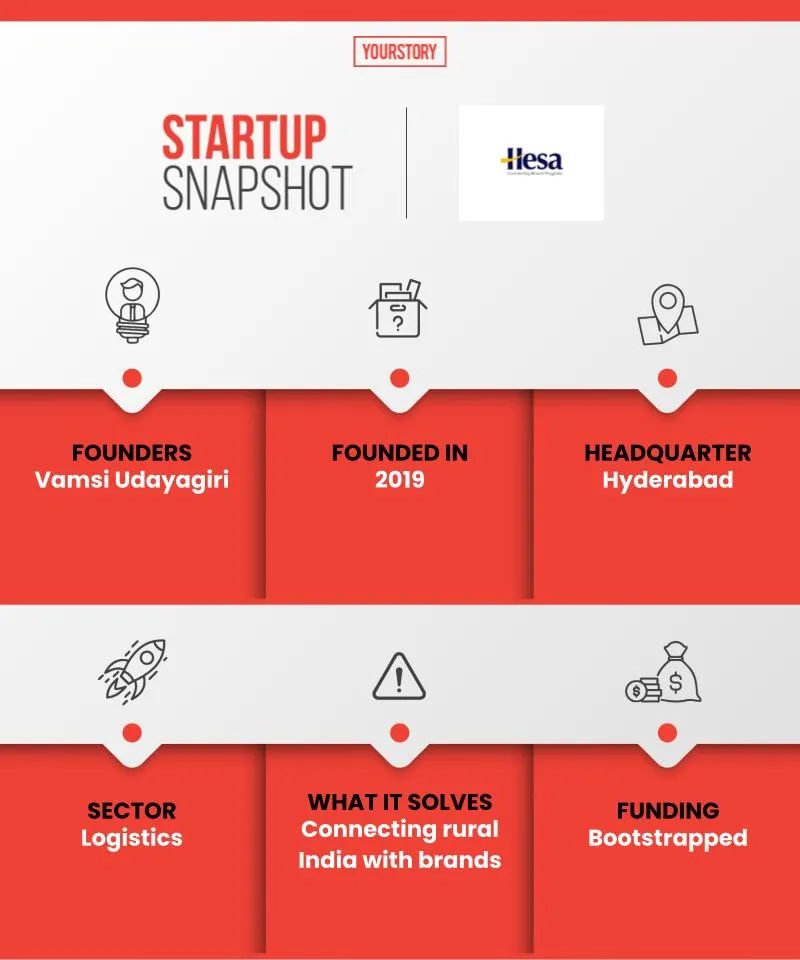How this bootstrapped startup aims to create an Amazon for rural India
Hyderabad-based startup HESA is connecting Bharat with India phygitally. It partners with brands keen to promote and/or sell products or services in rural markets and connects rural entrepreneurs, including farmers, to sell their products in urban areas.
Rural value chains always fascinated Vamsi Udayagiri. Through his professional career spanning 12 years, he worked on supply chains and also successfully exited Hyderabad-based agritech startup .
This was one of the main reasons he started Hyderabad-based in July 2019. The platform, which is “connecting Bharat with India and India with Bharat phygitally,” provides access, enablement, and employment options and aims to “bridge the gap for the world’s largest customer base that resides in rural India.”

Working onground
The app went live in January 2020, but Vamsi’s eureka moment was in June 2019. During his startup days, Vamsi was returning from a fortnight-long trip of over 100 villages in Andhra Pradesh and Telangana and realised the starkness of the urban-rural divide.
“The opportunity for pivoting a successful enterprise while connecting the dots and empowering millions of rural livelihoods became strikingly clear in my mind. I had this vision to create an Amazon for rural India, but with a difference,” Vamsi says.
What does it do?
Vamsi felt that people should be able to not only order products but services too. People in Bharat should be able to do financial transactions, bill payments, and insurance transactions, while rural businesses and entrepreneurs should be able to not only buy products and services but sell them too.
HESA — which connects Bharat with India phygitally — partners with brands keen to promote and/or sell products or services (including banking and financial services) in rural markets. They also connect rural entrepreneurs, including farmers, to sell their products in the market.
“We are an integrated rural marketplace for buying and selling of products and services, including financial transactions. HESA’s platform connects brands offering any and every kind of products and services to rural consumers. So, from building awareness about brands through rural promotions to creating a local sales force and ensuring last-mile distribution and delivery, we enable all,” he says. HESA connects both ends and enables buying and selling with an almost "doorstep access.”
“Our core offering is a physical network of village-level micro entrepreneurs called “Hesaathis,” spread across villages and connected through our tech platform. The main role of the Hesaathi is to build a network and establish smooth communication among both parties,” Vamsi says.
Enabling the Hesaathis
A Hesaathi is seen as an on-ground, resident village-level consultant and partner (“saathi”) with digital prowess. S/he is approachable at all times and has a range of solutions for multiple challenges that an ordinary citizen faces, and enables buying and selling for rural customers at both ends.
“The HESA app went live in January 2020 with pilots in Warangal, Vishakhapatnam, and East Godavari districts. Fifty Hesaathis were onboarded as we were keen to prototype and pilot before we went ahead and scaled up,” Vamsi says.
But, in less than three months, the lockdown was announced. “I was advised to stop the pilots, let the Hesaathis go, and retain minimum staff with a token salary. However, there was a loss of livelihoods all around, whether it was cab drivers and hospitality staff or farmers and other agri-producers who were unable to travel into cities to deliver their products,” he says.
Another thought that worried him was regarding the people who were homebound. How would they sustain themselves if they could not get basics delivered at their doorstep? This motivated Vamsi to carry on.
Between March and April 2020, HESA added products and services besides financial transactions on its platform. It set a target to onboard 1,000 Hesaathis by May end. The startup expanded its network aggressively in rural India and also started delivery services in urban regions, touching over 1,100 Hesathis as May ended.

Why would it work?
Vamsi knew that the startup would work as over 65 percent of India’s population lives in rural areas, and continues to face challenges such as deficiency of communication channels, credit availability, and marketing innovations.
There is also a massive need for an integrated rural marketplace and local experts or buddies (“saathis”) that villagers can reach out to for all their requirements, advice, and help.
“I knew it was time as the world’s largest customer base of 850 million people were residing in rural India. This is 2.5 times as compared to those in urban regions. When it comes to selling to the rural market, businesses continue to struggle on multiple accounts - awareness, availability, visibility, delivery, and sales. When rural entrepreneurs want to sell their products, their struggle is also on similar lines,” he says.
Once the idea was in place, Vamsi roped in his wife, Hema Nandiraju, as the co-founder. Hema, who brings a decade of experience in managing rural events, training, and development, and extensive experience of working with SHGs, was an appropriate partner.
He also roped in his childhood friend, Srikanth Yanamandra, an IT and Product Development specialist. “My ex-colleague from Ramco days, Sridhar Sivalenka, was also inspired and joined us,” he says.
Today, HESA is a team of 30 with an extended team of over 5,000 rural micro-entrepreneurs and Hesaathis.
The workings
HESA is a biometric device-integrated technology, enabled to integrate multiple business functions and APIs. The platform is sector and brand agnostic and connects rural entrepreneurs looking to sell their products to brands and urban consumers.
“Hence, we become the one-stop rural connectors for our clients in urban and rural landscapes. This last-mile access to their target customers is a win-win for businesses and for rural consumers. In the process, we are also enabling livelihoods at multiple levels,” Vamsi explains.
The platform supports those currently employed, self-employed, and unemployed to increase their incomes and ensure a better quality of life for themselves and their families. Besides impacting the lives and livelihoods of those serving the rural economy like shop and kiosk owners, teachers, farmers, etc., HESA is also onboarding those who earn their living on wheels – truck, autorickshaw, and tempo drivers.
“As per a post-intervention evaluation survey conducted in two districts of Andhra Pradesh, HESA’s Village-Level Entrepreneurship Programme, covering 6,150 youth, has helped enable livelihoods of 92 percent participants. Over 80 percent reported increased confidence levels and 50 percent felt more respected within their community,” Vamsi says.
Model and the market
A new breed of ecommerce startups is helping small sellers ride India’s ecommerce wave by providing them with the back-end solutions they need without starting from scratch. These include ShopX, LaYuva, , , , , , Ezmall Zepo, , and . Delhi-based Mimo, Chennai-based Boonbox, and 72Networks are focusing on last-mile rural connectivity.
But speaking of the differentiator Vamsi says, HESA is “a multi-dimensional revenue model, where the primary revenue comes in from every transaction that happens on the digital platform.” This is supported by a marketing and service-based secondary revenue model with sources like on-ground rural promotions and activations, rural contract staffing, promotions the app, etc.
“The wide portfolio with varying margins and volume of business makes our model a resilient and balanced one,” Vamsi says. The team is working with over 35 clients and spans a range of sectors such as agritech, fintech, retail, etc.
The brands it is associated with include HDFC Life, Airtel Payments Bank, Reliance General Insurance, Stree Nidhi (Government of Telangana), Metro, Walmart, Bajaj Finance, , Healthier Hearts Foundation, Dodla Dairy, Gramcover, , , , and .
Vamsi says around 7.5 lakh rural consumers have availed their services/products.
“As of December 2020, we have clocked Rs 22 crore revenue (Rs 75 crore GMV), onboarded 5,000+ Hesaathis, have established 35+ B2B tie-ups and reached over 7.5 lakh rural consumers in two states (AP and Telangana) and 11 districts. Our average monthly growth has been 25 percent,” he says.
The team aims to reach 50,000 villages in the next two years and enable at least 50,000 rural livelihoods in the process. “Our cumulative GMV should cross Rs 2,000 crore by 2022,” Vamsi says.
Edited by Teja Lele










